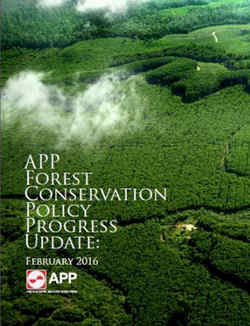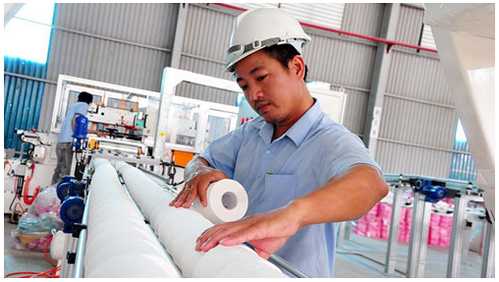More than 3,500 canals blocked as Peatland Best Practice Management Project accelerated
Agroforestry programme rolled out to improve community welfare while supporting protection of natural forests in the supply chain
Belantara Foundation, initiated by APP, ready to manage and fund conservation projects in Indonesia
Fire prevention measures strengthened with implementation of new Integrated Fire Management Strategy
On the 3rd anniversary of the company’s Forest Conservation Policy (FCP), Asia Pulp & Paper Group (APP) announces the acceleration of their Peatland Best Practice Management Project (PBPMP).
“Looking ahead, we are ready to learn from our experience and to further collaborate with other stakeholders in our landscape, in our country, and beyond, to try to create a better world for future generations.”
The FCP, launched in February 2013, is APP’s commitment to immediately end deforestation in its supply chain and bring sustainability to the forefront of the company’s operations. Policy commitments include the ending of natural forest conversion throughout its supply chain, best practice in peatland management, and adopting a collaborative approach to resolving social issues.
 Specifically, work to block over 3,500 perimeter canals to increase water levels in APP suppliers’ concessions located on peatland has recently been completed, with a total target of 7,000 dams to be built by the end of the first quarter of 2016. This is in addition to the retirement of 7,000 hectares of commercial plantation areas in Riau and South Sumatra, announced by APP in August 2015. In total, APP and its suppliers have allocated approximately 600,000 hectares for forest conservation and ecosystem restoration within its suppliers' concessions. Peatland areas are particularly vulnerable to forest fires and these initiatives to manage and protect them are a critical part of APP’s new Integrated Fire Management (IFM) strategy. The move supports efforts to significantly lower the risk of wildfires in the region.
Specifically, work to block over 3,500 perimeter canals to increase water levels in APP suppliers’ concessions located on peatland has recently been completed, with a total target of 7,000 dams to be built by the end of the first quarter of 2016. This is in addition to the retirement of 7,000 hectares of commercial plantation areas in Riau and South Sumatra, announced by APP in August 2015. In total, APP and its suppliers have allocated approximately 600,000 hectares for forest conservation and ecosystem restoration within its suppliers' concessions. Peatland areas are particularly vulnerable to forest fires and these initiatives to manage and protect them are a critical part of APP’s new Integrated Fire Management (IFM) strategy. The move supports efforts to significantly lower the risk of wildfires in the region.
Integrated Forestry and Farming System
Another forest protection initiative is the Integrated Forestry and Farming System Programme launched by APP during COP21 in Paris. The programme aims to help local communities develop alternative livelihoods to achieve economic development while also keeping Indonesia’s forests intact.
As a first step in its implementation, community members will be given equipment and support in the form of microfinance or revolving funds to help kick-start local businesses. Horticultural training will also be given to help improve community capacity in managing fruit and vegetable crops using the agroforestry system. The programme will include 500 villages across the APP supply chain with up to $10 million invested over the next five years.
Fire Management
In 2016, the company rolled out its new comprehensive new Integrated Fire Management (IFM) strategy. The strategy consists of a number of key initiatives:
- Fire management experts TREK Wildland Services from Canada and Working on Fire (WOF) from South Africa will provide 400 APP staff members and their suppliers with Incident Command System (ICS) fire training. The programme will train fire commanders on the practical application of ICS including early detection and rapid response, with the aim of increasing the ability to prevent and fight fires as early as possible.
- Two new aircraft with state-of-the-art thermal imaging cameras will help gather hotspot data with far greater accuracy than satellite imaging. Information will be distributed in near real time to APP’s in house Geographic Information System (GIS) and distributed to field staff within 15 minutes, allowing rapid response to emerging fire threats.
- New fire patrol route maps based on past fire occurrence and local risk factors to ensure that firefighters are closely mapped to identified risks.
- Two medium lift helicopters capable of carrying up to 3,500 litres of water to improve the sheer speed and power of APP’s waterbombing capabilities.
Belantara Foundation
Since committing to a landscape approach in 2015, the company has worked to establish a platform to help manage and fund landscape conservation programmes in Indonesia. As a result of these efforts, APP has initiated the Belantara Foundation. Today we announce the newly appointed Advisory Board, consisting of widely respected individuals drawn from the government, non-profit and corporate sectors. With the Foundation’s personnel, full working remit and due diligence processes in place, Belantara is now ready to work together with other key stakeholders in the landscape to help support the protection and restoration of Indonesia’s forests.
Belantara Foundation will work with communities, civil society, government and businesses to help ensure a careful balance is found between economic development, the livelihoods of people in local communities and environmental conservation. This involves overseeing natural forest restoration and endangered species protection and conducting studies to strengthen sustainable landscape management. In addition, the Foundation will support community empowerment and local economic development, especially in areas that rely heavily on natural resources.
By coordinating and collaborating with different stakeholders, Belantara will help to ensure that different initiatives are aligned and information is shared. Belantara will also fund landscape conservation initiatives aligned to the Foundation’s objectives.
Social Commitments
During 2015, APP continued work to resolve social conflict in its supply chain, while also strengthening the implementation of Free Prior and Informed Consent (FPIC). This includes a commitment to implement FPIC in areas where new developments are proposed, as well as revisions to the FPIC protocol to expand its scope to include high impact activities on developed plantation areas. Over the last year, the FPIC process has been completed for both the new OKI mill development and PT Karawang Ekawana Nugraha (PT KEN), an APP Ecosystem Restoration forest concession in South Sumatra.
Aida Greenbury, Managing Director of Sustainability and Stakeholder Engagement at APP said,
“On the third anniversary of our Forest Conservation Policy launch we are pleased to report that our continued work to implement the policy, together with efforts to align our ambitions with those of other actors in Indonesia’s forests have resulted in tangible progress. We now have the building blocks for a sustainable model of forest and pulp and paper operations whereby forests are protected, communities empowered and our supply chains strengthened.
"Looking ahead, we are ready to learn from our experience and to further collaborate with other stakeholders in our landscape, in our country, and beyond, to try to create a better world for future generations."
You can find full details of APP’s FCP progress report https://www.asiapulppaper.com/sustainability/vision-2020/forest-conservation-policy.
About APP-Indonesia
Asia Pulp & Paper Group (APP) is a trade name for a group of pulp and paper manufacturing companies. APP is responsible for delivering quality products to meet the growing global demand for tissue, packaging and paper. On any given day, our products find their way into the hands of consumers in various branded forms all over the world.
Started in 1972 with Tjiwi Kimia producing caustic soda, now we run nine mills located in Java and Sumatra islands with an annual combined pulp, paper, packaging product and converting capacity of over 9 million tons. Today, APP markets its products in more than 120 countries across six continents.
Over the years, we have expanded our operations significantly through the acquisition and expansion of several of our pulp and paper mills. It’s our commitment to customer satisfaction that enables us to grow our share in paper sales worldwide and broaden our presence through offices in many countries. We believe ‘tradition and modernity go hand in hand’ which means we value long term relationships as part of our Eastern traditions, while we also are eager to embrace the modern values of innovation and efficiency.
Maintaining the integrity of our supply chain is also crucial to APP’s operations. APP launched its Sustainability Roadmap Vision 2020 in June 2012 and its Forest Conservation Policy in February 2013, to further improve its environmental performance, biodiversity conservation, and protection of community rights. Key objectives of this roadmap are to ensure that its pulpwood suppliers adopt High Conservation Value (HCV) and High Carbon Stock (HCS) protection, peatland protection, and be 100% Sustainable Forest Management (SFM) certified by 2020.
In April 2014, APP launched its commitment to support the protection and restoration of one million hectares of forest in Indonesia. In line with that commitment, by 2015 APP and its suppliers have allocated approximately 600,000 hectares for conservation within its suppliers’ concessions and for ecosystem restoration.


 The announcement is based on the joint assessment that Indonesia is fully ready to implement the
The announcement is based on the joint assessment that Indonesia is fully ready to implement the  Specifically, work to block over 3,500 perimeter canals to increase water levels in APP suppliers’ concessions located on peatland has recently been completed, with a total target of 7,000 dams to be built by the end of the first quarter of 2016. This is in addition to the retirement of 7,000 hectares of commercial plantation areas in Riau and South Sumatra, announced by APP in August 2015. In total, APP and its suppliers have allocated approximately 600,000 hectares for forest conservation and ecosystem restoration within its suppliers' concessions. Peatland areas are particularly vulnerable to forest fires and these initiatives to manage and protect them are a critical part of APP’s new Integrated Fire Management (IFM) strategy. The move supports efforts to significantly lower the risk of wildfires in the region.
Specifically, work to block over 3,500 perimeter canals to increase water levels in APP suppliers’ concessions located on peatland has recently been completed, with a total target of 7,000 dams to be built by the end of the first quarter of 2016. This is in addition to the retirement of 7,000 hectares of commercial plantation areas in Riau and South Sumatra, announced by APP in August 2015. In total, APP and its suppliers have allocated approximately 600,000 hectares for forest conservation and ecosystem restoration within its suppliers' concessions. Peatland areas are particularly vulnerable to forest fires and these initiatives to manage and protect them are a critical part of APP’s new Integrated Fire Management (IFM) strategy. The move supports efforts to significantly lower the risk of wildfires in the region. Asia Pulp & Paper Group (APP) has announced it is committing to retire around 7,000 hectares of commercial plantation areas to protect threatened carbon-rich peatlands, the first time that plantations on tropical peatland have been retired for conservation purposes worldwide.
Asia Pulp & Paper Group (APP) has announced it is committing to retire around 7,000 hectares of commercial plantation areas to protect threatened carbon-rich peatlands, the first time that plantations on tropical peatland have been retired for conservation purposes worldwide.